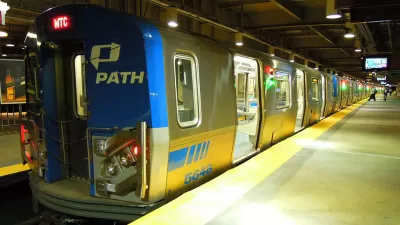A funding agreement between New York, New Jersey, and the U.S. DOT for one of the most important rail projects in the nation is in danger of collapsing because of the way the two states are financing their share of the $12.9 billion cost.

"Trump administration officials have suggested they may scrap a two-year-old agreement to fund a nearly $13 billion proposed commuter rail tunnel under the Hudson River with an even mix of federal and state money," report and
in September 2015 between Gov. Chris Christie (R-N.J) and Gov. Andrew Cuomo (D-N.Y.) to pay for half the costs, if the federal government would fund the other half.
President Obama's transportation secretary, Anthony Foxx, agreed in November 2015, and all parties: Amtrak, the U.S. Department of Transportation (U.S. DOT), New York, and New Jersey, formed the Gateway Development Corporation to replace the deteriorating 107-year-old Hudson River rail tunnels.
On Dec. 13, Govs. Christie and Cuomo announced the details of their financing plan: $1.9 billion by NJ Transit, $1.75 billion by the State of New York and $1.9 billion previously committed by the Port Authority of New York and New Jersey Board of Commissioners.
On Dec. 19, Bredderman and Geiger write that federal loans totalling about $5.5 billion from the U.S. Department of Transportation's Railroad Rehabilitation & Improvement Financing (RRIF) which NJ Transit, New York State, and the Port Authority hoped to use wasn't sitting well with U.S. DOT.
[A] federal transportation spokeswoman said her agency now views those loans as part of the federal government's contribution to the tunnel, a position that appeared to break with past funding practices for large transportation projects, in which states often use federal loans to finance their share.
"I think it's a nonsensical position," said Scott Rechler, chairman of the think tank Regional Plan Association and a Metropolitan Transportation Authority board member. "The states are saying they are going to pay the loans back with interest. This is a project that can't get financed any other way."
The spokeswoman's response: "They propose the project is funded half in grants and half in loans. This is not a serious plan at all."
Other regions raise their own tax revenues
It is true that with some other major transportation projects, transit agencies do indeed bring local funds to the table, as shown after the November election last year. "Consider that voters in 26 states approved expenditures of nearly $200 billion for transportation on Nov. 8, 2016," notes a Planetizen election roundup of transportation measures.
However, the Trump administration viewed those successful ballot measures as a reason to reduce or even stop funding transit projects. "These regions realize waiting for Federal grant funding is not the most efficient way to meet their local transportation needs," states the president's 2018 budget document (accessible in May post).
The Gateway Development Corporation remains confident, though, that the U.S. Department of Transportation will lend their three partner agencies the funds, reports the AP on Dec. 21.
Trump infrastructure plan
Upon signing the GOP tax bill on Dec. 22, President Trump quipped, in response to a question as to why he didn't start his agenda with infrastructure, he thought it would be "easy," according to CNN.
"We’re going to have tremendous Democrat support on infrastructure as you know. I could have started with infrastructure. I actually wanted to save the easy one for the one down the road. We’ll be having that done pretty quickly.”
New fee for NJ Transit rail commuters
NJ Transit rail commuters will be saddled with a new fee to pay for the RRIF loan, reports Larry Higgs of NJ Advance Media for NJ.com on Dec. 14.
New York-bound rail commuters would pay a 90 cent per-trip surcharge to fund the tunnel project starting in 2020. The surcharge would jump to $1.70 in 2028, and to $2.20 in 2038.
About the math....
Last July, Higgs explained why the the two states are paying less than half of the $12.9 billion project, which includes rehabilitation of existing tunnels.
The [Draft Environmental Impact Statement released by the Federal Railroad Administration] put construction of two new tunnels at $11.2 billion and the cost to rehabilitate the existing 106-year-old rail tunnels at $1.7 billion, said John Porcari, interim executive director of the Gateway Development Corporation.
FULL STORY: Hudson River tunnel project's funding in jeopardy

Planetizen Federal Action Tracker
A weekly monitor of how Trump’s orders and actions are impacting planners and planning in America.

Restaurant Patios Were a Pandemic Win — Why Were They so Hard to Keep?
Social distancing requirements and changes in travel patterns prompted cities to pilot new uses for street and sidewalk space. Then it got complicated.

Map: Where Senate Republicans Want to Sell Your Public Lands
For public land advocates, the Senate Republicans’ proposal to sell millions of acres of public land in the West is “the biggest fight of their careers.”

Maui's Vacation Rental Debate Turns Ugly
Verbal attacks, misinformation campaigns and fistfights plague a high-stakes debate to convert thousands of vacation rentals into long-term housing.

San Francisco Suspends Traffic Calming Amidst Record Deaths
Citing “a challenging fiscal landscape,” the city will cease the program on the heels of 42 traffic deaths, including 24 pedestrians.

California Homeless Arrests, Citations Spike After Ruling
An investigation reveals that anti-homeless actions increased up to 500% after Grants Pass v. Johnson — even in cities claiming no policy change.
Urban Design for Planners 1: Software Tools
This six-course series explores essential urban design concepts using open source software and equips planners with the tools they need to participate fully in the urban design process.
Planning for Universal Design
Learn the tools for implementing Universal Design in planning regulations.
Heyer Gruel & Associates PA
JM Goldson LLC
Custer County Colorado
City of Camden Redevelopment Agency
City of Astoria
Transportation Research & Education Center (TREC) at Portland State University
Camden Redevelopment Agency
City of Claremont
Municipality of Princeton (NJ)



























